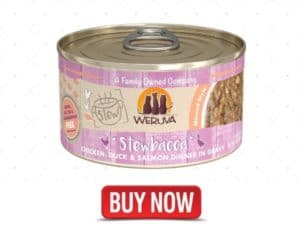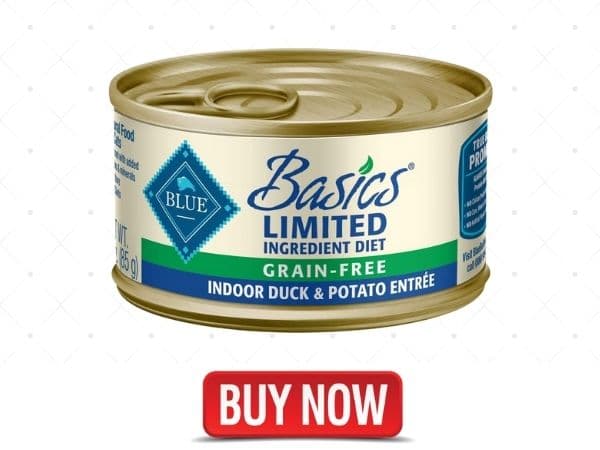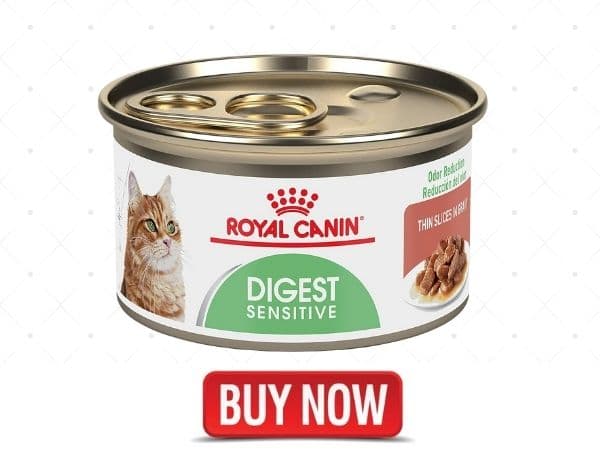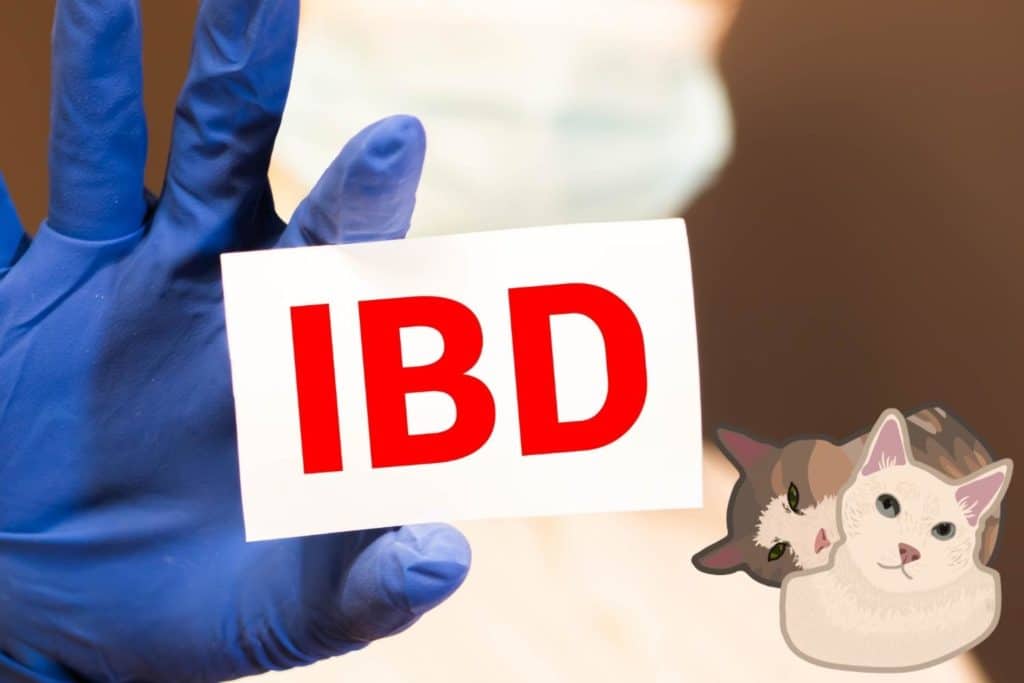
If your cat is struggling with IBD or Inflammatory Bowel Disease, finding the right diet for your fur friend can be a massive challenge. Because each cat is different in terms of nutritional needs, so let’s find out the best cat food for ibd.
The choice you make would vary depending on the cat’s age, breed, daily activity, existing health issues, and many more. Before you select the best cat food for IBD, you need first to understand what it is.
| Image | Brand | Price | Prime | Buy |
|---|---|---|---|---|
 Top Top | Weruva | PrimeEligible | Buy Now | |
 Top Top | Blue Buffalo | PrimeEligible | Buy Now | |
 Top Top | Plume | PrimeEligible | Buy Now | |
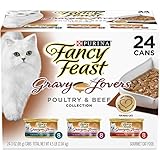 Top Top | Purina Fancy Feast | PrimeEligible | Buy Now |
You might also like to know about the food which we recommend most as the best grain free cat food, surely it’s non-allergic and safe for ages and breeds.
What is Feline IBD/Inflammatory Bowel Disease?
Feline IBD is a health condition in cats that affects their GI or gastrointestinal tract, making them chronically inflamed and irritated. These inflammatory cells tend to infiltrate the GI tract walls, thereby thickening them disrupting the tract’s ability to absorb or digest food properly.
Regardless of their age, cats might be affected due to IBD. However, the disease mostly affects old or middle-aged cats.
The prime cause of inflammatory bowel disease is currently unknown. However, evidence from scientific studies suggests that the disease stems from complex and abnormal interactions between a cat’s immune system, the bacterial population within the intestine, diet, & other factors.
In addition, depending on data acquired from dogs and people suffering from IBD, immune system-based genetic abnormalities can factor in the induction of feline IBD.
The disease can take various forms depending on which section of the gastrointestinal tract is affected and the involved inflammatory cells. For example, if the stomach becomes inflamed, this condition is termed gastritis. Alternatively, if the cat’s small intestine becomes inflamed, it is termed enteritis.
Next, if the large intestine or colon becomes inflamed, it is called colitis. A common variant of IBD is called lymphocytic plasmacytic enteritis. It involves plasma cells and inflammatory lymphocytes invading a cat’s small intestine. Eosinophils can also be involved in the onset of feline IBD.
Is Feline IBD Different From Feline IBS?
IBD is an autoimmune health condition & differs from stress-induced feline colitis termed as IBS (Irritable Bowel Syndrome). IBD stems from gut inflammation & can happen due to several conditions associated with a cat’s autoimmune issues.
On the contrary, IBS stems from stress & might cause spastic colon issues that cause diarrhea. Therefore, IBS can be controlled via stress management. In addition, IBD can be managed via nutritional medication and therapy.
Symptoms of Inflammatory Bowel Disease in Cats
Popular signs of Inflammatory Bowel Disease in cats include
- Weight loss
- Diarrhea
- Vomiting
- Appetite change
- Lethargy
IBD often manifests in the form of increased appetite with diarrhea. However, felines might also decrease appetite, leading to weight loss issues.
Simply put, cats that suffer from IBD tend to struggle to absorb nutrients and digest them.
Selecting the Right Diet for Cats with IBD
Almost 60 percent of felines troubled with GI issues start improving when given nutritional therapy. However, the diet paired with the necessary drugs ensures that your cat heals faster. Experts say that IBD is an incurable disease. However, you can help manage it with a proper diet.
Cats suffering from IBD require the same nutrients as any healthy feline. However, they aren’t as tolerant to food items that don’t fall under the carnivore diet purview.
Simply put, they require a lot of digestible protein sourced from animals. In addition, they require fat (animal-sourced) that is loaded with Omega-3. Moreover, they must avoid additives found in pet food as they can lead to inflammation of the digestive system.
This includes flavors, colors, sugar, or other ingredients that make the condition worse. To help nourish your pet, it is suggested that you give them easy-to-digest food with a proper fraction of high-quality animal protein.
It is recommended that pet owners provide their cats with a minimum of 87 percent protein for better IBD control.
Although it isn’t clear which protein is easy to digest, it is recommended that you offer your cat minimally-processed protein only. Avoid food that contains plant protein such as pea protein, corn gluten meal, soy protein, or potato protein.
Start By Sourcing High-Quality Animal Protein:
In your search for the best food for cats with IBD, it is important to look for options that don’t have any by-products or generic meat meals. Although they aren’t of bad quality, the protein might not be sufficient for your pet’s dietary requirements.
By-products are comprised of highly digestible proteins. But, unfortunately, it might also contain indigestible parts that tend to weigh down your cat and worsen the IBD.
Prioritize Food With Novel Proteins and Limited Ingredients:
Since intolerances and food allergies have a big role in IBD, it is better to avoid allergenic ingredients. Common cat diet allergens are pork, chicken, fish, beef, eggs, and dairy.
As animal by-products or meat might contain many allergenic ingredients, they should not be a part of your cat’s diet.
Ensure the Food is Loaded with Moisture:
If your cat suffers from IBD, it is important to give them a rich moisture diet. This helps combat dehydration which is critical to help keep your cat healthy.
Instead of feeding dry kibble to your cat, it is better to give them a canned, raw, freshly-cooked, or even rehydrated diet.
Seek Food that Controls Inflammation:
When selecting the right food for your cat suffering from IBD, make sure you cut out the inflammatory additives such as artificial colors, lactose, carrageenan, flavors, or preservatives like BHT, BHA, TBHQ, or ethoxyquin.
Instead, look for dietary options that guarantee the introduction of probiotics, omega-3, DHA, and EPA.
Top 3 Cat Foods for IBD
1. Weruva Classic Grain-Free Wet Cat Food
Stewbacca by Weruva is a high-quality wet cat food ideal for cats suffering from IBD. This can feature cage-free chicken, wild-caught salmon, and ducks. In addition, it is a protein-rich source that comprises perfectly minced pieces in the form of a delicious stew that your cat would love to bite into.
It is an all-natural recipe rich in Omega-3 known to promote healthy coat and skin. The best thing about Stewbacca is that it is gluten-free, grain-free, & doesn’t contain any artificial colors or preservatives. It is the best cat food for ibd.
Given that the food is formulated keeping in mind the need for hydration, this dietary choice would be perfect for cats needing relief from IBD. Moreover, cat food is low in carbohydrates that help your pet thrive.
Pros:
- It comes with added minerals, vitamins, & antioxidants
- Ethically sourced ingredients, including protein components
- Help keep your cat hydrated for better digestive health
- Wild-caught salmon fish is sourced from rivers in Alaska
- It comes in a range of flavors for fussy eaters
Cons:
- It contains a lot of cartilage and bone fragments
- It might make your cat gaseous
2. Blue Buffalo Grain-Free Wet Cat Food
The best thing about giving your cat limited ingredient cat food is that you know what’s going into your cat’s diet. The Blue Buffalo cat food is a grain-free alternative that packs in protein from one animal, a high-quality duck. In addition, it helps boost the energy requirements of adult felines.
The diet doesn’t contain any beef or chicken-based protein. Its smooth texture feels good on your cat’s tongue. It is made from the finest quality natural ingredients & is enhanced with minerals and vitamins. This wheat-free formula doesn’t contain any allergens, such as artificial preservatives or flavors.
The taste and smell are highly palatable for the cats, especially if they don’t love any abrupt change in their diet.
Pros:
- It contains pumpkin and potatoes to aid better digestion
- Comprises of Omega-3 & Omega-6 for healthy coat and skin
- It doesn’t contain any protein by-products
- It doesn’t contain any soy, wheat, corn, eggs, or dairy
- It doesn’t house any artificial preservatives or flavors
Cons:
- It contains pea flour which isn’t necessary for cats
- Packaging isn’t strong, tends to bend and break during shipping
3. Royal Canin Thin Slices Wet Cat Food
Ideal for cat breeds of all sizes, Royal Canin wet food, is ideal for felines that have been dealing with a sensitive stomach for a long time. This formula contains thin slices of protein that are easy to digest with better nutrient absorption.
Moreover, cat food can help reduce odor from the stool while aiding in weight management. If your pet has IBD, this cat food would be a perfect choice for daily feeding necessities. The formula has a precisely balanced blend comprising minerals and vitamins that ensure health for your cat.
The right balance of taste and smell ensures that your cat cleans up its bowl every time served. Apart from a balanced nutrition profile, this wet food has an easy-to-digest kibble shape that prevents any dental tartars.
Pros:
- Ideal for cats with sensitive stomach and inflammation issues
- Provides ample moisture content to the cats
- The formula helps prevent any tartar buildup or plaque issues
- Ideal for fussy eaters & best cat food for ibd
- It doesn’t cause vomiting or gas issues for IBD patients
Cons:
- It might cause constipation in older cats
- Too costly as compared to other brands
In our new resource, we write about how to stop a cat from meowing for food and keep ants out of the cat food bowl, which will help you understand your cats and their needs better.
Conclusion
IBD can be a problematic issue for cats, especially as they age. Therefore, it is important to ensure that you provide them with the best nutrition with regular veterinarian visits.
Your feline might not like the sudden dietary change at first, but a slow transition from old food to the new one would bode well for their health.

